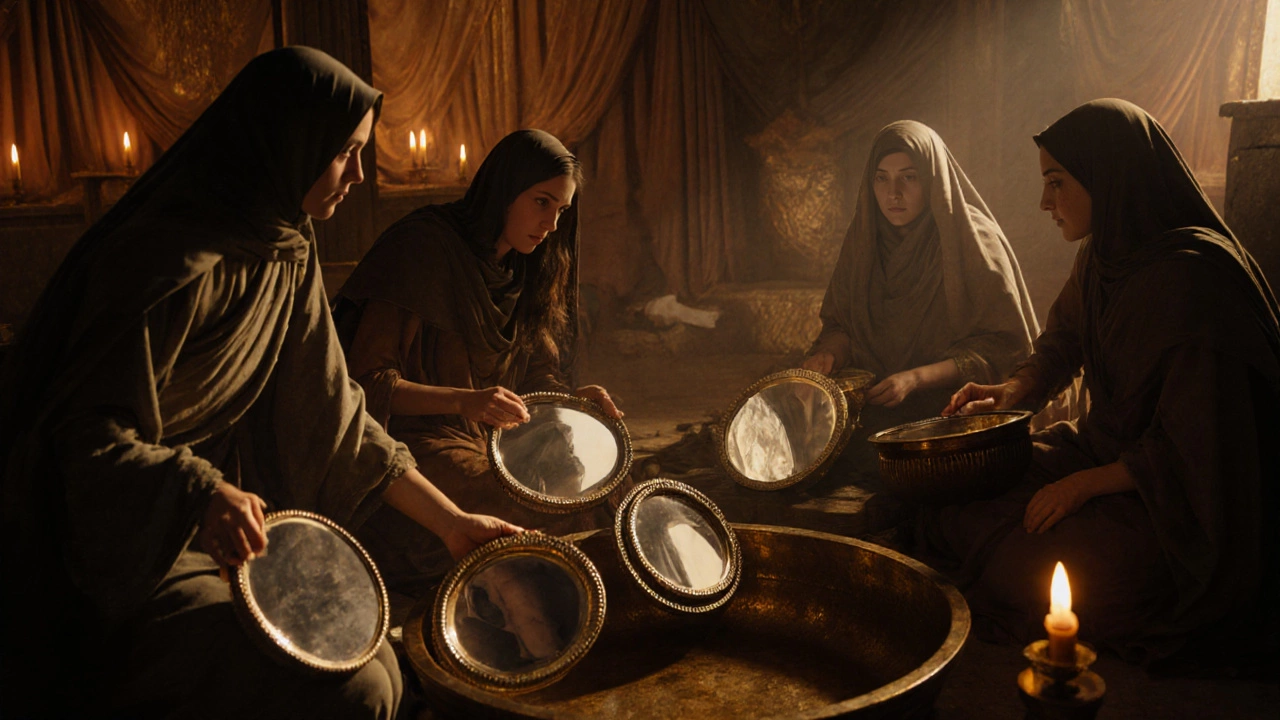When you look into a mirror, what do you see? Your face, your clothes, maybe a tired expression after a long day. But for people in biblical times, mirrors weren’t just tools for checking your appearance-they carried deep meaning. The Bible doesn’t talk about mirrors often, but when it does, it’s never about vanity. It’s about truth, self-awareness, and the soul.
What Mirrors Meant in Biblical Times
In ancient Israel, mirrors weren’t the glass ones we have today. They were made of polished bronze or silver, heavy and expensive. Only the wealthy owned them. A mirror wasn’t something you hung on the wall-it was a personal item, often carried by women. The Bible mentions mirrors in just a few places, and each time, it’s tied to something far deeper than looks.
One of the earliest mentions is in Exodus 38:8. It says the bronze basin used for washing in the tabernacle was made from the mirrors of the women who served at the entrance to the tent of meeting. These weren’t just discarded objects. They were offered up as sacred gifts. The women gave up something personal, valuable, and intimate to help create a space for worship. Their mirrors became part of something holy. That’s not about beauty. It’s about surrender.
1 Corinthians 13:12: Seeing Through a Glass Darkly
One of the most quoted verses about mirrors comes from Paul’s letter to the Corinthians: "For now we see only a reflection as in a mirror; then we shall see face to face. Now I know in part; then I shall know fully, even as I am fully known." (1 Corinthians 13:12)
Paul isn’t talking about vanity. He’s talking about how limited our understanding of God is right now. Back then, mirrors were cloudy, distorted. You couldn’t see yourself clearly. Paul says our spiritual knowledge is like that-partial, blurry, incomplete. But one day, he promises, we’ll see clearly. Not through a reflection. Not through interpretation. But directly.
This verse flips the idea of mirrors on its head. Instead of being a tool for self-observation, it becomes a symbol of our spiritual blindness. We think we understand God, others, even ourselves. But the Bible says: you’re seeing a dim image. True clarity comes only from God.
James 1:23-24: The Mirror of God’s Word
James gives us another mirror metaphor, but this one is different. He says: "Anyone who listens to the word but does not do what it says is like someone who looks at their face in a mirror and, after looking at themselves, goes away and immediately forgets what they look like." (James 1:23-24)
Here, the mirror isn’t about your physical appearance. It’s about God’s Word. When you read Scripture, it shows you who you really are-your pride, your selfishness, your gaps between belief and action. But James warns: if you just glance at it and walk away without changing, you’ve wasted the moment. You didn’t let the reflection change you.
This isn’t about looking good. It’s about being honest. The Bible isn’t asking you to fix your hair in the mirror. It’s asking you to fix your heart.

Mirrors as Symbols of Truth and Self-Deception
The Bible rarely uses mirrors to describe beauty. Instead, it uses them to expose truth. In a culture that valued outward appearances, the Bible keeps redirecting attention inward. Proverbs 27:19 says: "As water reflects the face, so one’s life reflects the heart."
That’s powerful. It’s not saying your face looks like your heart. It’s saying your life-your choices, your words, your habits-reflects what’s inside. You can’t hide behind a good appearance if your heart is full of bitterness, greed, or pride. The mirror doesn’t lie. Your actions don’t lie.
Think about it: when someone lies, they often avoid eye contact. When someone is full of guilt, they avoid mirrors. The Bible knows this. That’s why it uses mirrors as a spiritual tool. It’s not about vanity. It’s about accountability.
Why the Bible Doesn’t Talk About Vanity Mirrors
You won’t find a verse in the Bible saying, "Don’t look in the mirror too much." But you will find plenty about pride, self-deception, and hypocrisy. Jesus called out religious leaders who looked righteous on the outside but were full of greed and selfishness inside (Matthew 23:25-28). He called them whitewashed tombs-beautiful on the outside, dead inside.
The Bible doesn’t condemn mirrors. It condemns using them to feed ego. Looking in the mirror to fix your hair is fine. Looking in the mirror to feel superior? That’s the problem.
There’s a difference between self-awareness and self-obsession. The Bible invites you into the first. It warns against the second.

Modern Reflections: What Does This Mean Today?
Today, we have mirrors everywhere. On our phones, in our social media profiles, in the comments we obsess over. We curate our lives to look perfect. We post selfies, edit our faces, chase likes. We’ve turned the mirror into a tool for validation.
But the biblical mirror doesn’t care about your filter. It doesn’t care how many followers you have. It asks: Are you living what you believe? Are you kind when no one’s watching? Are you humble when you succeed? Are you honest when it costs you?
That’s the real reflection. Not your face. Your choices.
If you want to use mirrors the way the Bible intended, try this: Before you look in the mirror each morning, pause. Don’t check your hair. Don’t adjust your outfit. Ask: "What needs fixing in me today?" Let the mirror become a quiet moment of truth-not a tool for performance, but a doorway to change.
What the Bible Doesn’t Say About Mirrors
Some people claim the Bible says mirrors are evil or that they attract spirits. Others say hanging a mirror facing your bed brings bad luck. None of that is in Scripture. Those ideas come from folklore, superstition, or pop culture-not the Bible.
The Bible never condemns mirrors. It never says they’re dangerous. It never warns against their placement in your home. It only warns against what you do with the truth they reveal.
If you have a mirror in your bathroom, bedroom, or hallway, it’s not a spiritual threat. It’s an invitation. An invitation to honesty.
Practical Takeaways
- Don’t fear mirrors. They’re not evil. They’re neutral tools.
- Use them for reflection, not validation. Let them remind you to check your heart, not your hair.
- Let Scripture be your mirror. Read it daily-not to feel good, but to be changed.
- Stop comparing. Social media is a distorted mirror. The Bible calls you to truth, not perfection.
- Offer your "mirrors" to God. Like the women in Exodus, give up what you cling to for the sake of something greater.
The Bible doesn’t give you rules about mirrors. It gives you a deeper question: What are you willing to see?
